In IR4.0: Should We Be Teaching Children (and Everyone) How to Grow Their Own Food?
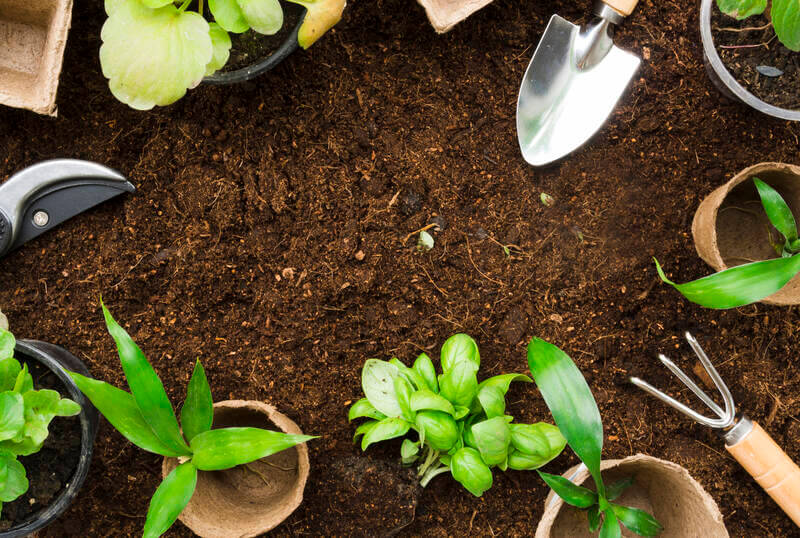
A couple of weeks ago, I was chatting online with a friend who teaches pre-school children at a Montessori School. She told me all about a recent class project where she taught her students about indoor gardening, planting and caring for varieties of lettuce, spinach and carrots.
“It was a great experience. The kids really got into it,” she said. “And it teaches them so many things. Patience. Responsibility. Respect for nature. When they see how much devotion goes into nurturing their own little vegetable garden in the classroom, they develop a greater admiration for farmers and the food industry. They avoid food wastage, even when veggies aren’t their favourite. I sometimes wish we could teach all children about growing their own food.”
Malaysia. Monica Tindall agrees. “Yes! We should be teaching children (and everyone else, for that matter) to grow their own food. Every little bit counts – not only in reducing our carbon footprint in terms of food miles, but the more green we put into the urban setting, the cleaner our air is too.”
Monica is the worldwide editor and driving force behind The Yum List, an Award-winning online blog and social media outlet described as a “gourmet food and luxury experience finder”. She also writes occasionally about the vegetable garden she maintains on the balcony of her own Kuala Lumpur apartment. Lately, she has noticed a burgeoning interest among her readers in growing their own edibles.
“With increased awareness of botanical cycles and how our daily choices impact the environment, growing your own food becomes a natural progression. Once you get into it, there is so much personal satisfaction gained from harvesting your own produce, the momentum becomes self-sustaining.” - Monica Tindall, worldwide editor for theyumlist.net and balcony gardening enthusiast
“With so much information available on the Internet, easy how-to videos on YouTube and interest groups on various social media platforms, it’s not hard to find what you need to not only get started but to problem solve along the way.” At first, with pandemic restrictions, people often ended up with additional time on their hands and had to find something to do. “But, with increased awareness of botanical cycles and how our daily choices impact the environment, growing your own food becomes a natural progression. Once you get into it, there is so much personal satisfaction gained from harvesting your own produce, the momentum becomes self-sustaining.” As one of her readers put it, “Monica, it must be so nice to be salad-independent.”
An Expanding IR4.0 Movement
Argentina. The momentum for home-gardening edibles and enhanced food self-sufficiency is trending worldwide. But, in many places, it’s not all that new. In Argentina, the ProHuerta (Pro Vegetable Garden) Programme has been in place for the last thirty years. Established as a joint initiative of the National Institute of Agricultural Technology and the Ministry of Social Development, it is aimed at helping families and organisations facing food insecurity.
According to María Agustina Macías, a Buenos Aires digital transformation consultant and former advisor to local authorities on SMART City planning, the programme has achieved widespread success assisting individuals and groups involved in the production and sale of their own foods and guaranteeing access to a balanced and diversified diet.
“It has done this by promoting agro-ecological vegetable gardens and farms, working together with families, local institutions and dedicated community spaces,” she said. The initiative also includes technical assistance and training, capital financing for water access projects and support for sales of produce through markets and peoples’ fairs. Presently, the ProHuerta Program reaches more than 4 million people, promotes 637,847 local vegetable gardens, occupies 9000 promoters, organises 744 agro-ecological fairs and gives more than 16 thousand families access to water.
“Environmental education for all ages is a big component too,” stressed Agustina. “Increased awareness changes behaviour and leads to consumption patterns which meet community needs through balanced resource management. Digital technology gives us a definite edge in getting the message out, but it’s the generations-old attraction of re-engaging with the land and with nature that keeps families and communities committed.”
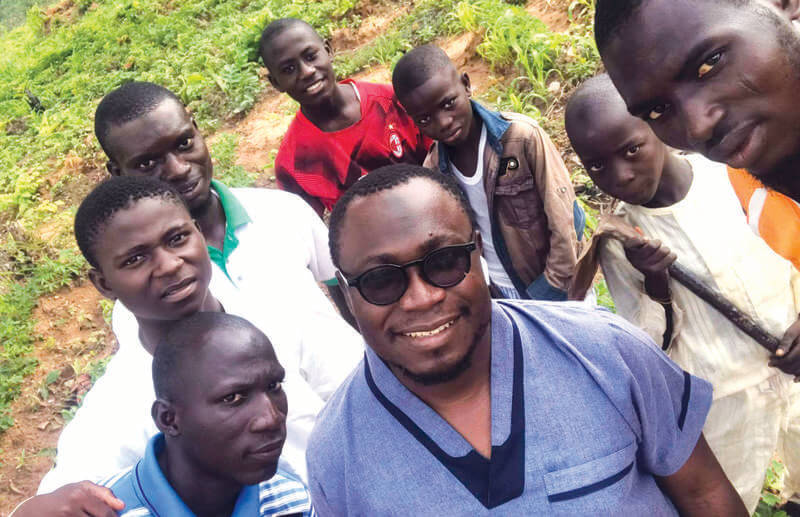
Prof Brainy and growers on the farm in Bida, Niger State
Nigeria. This sentiment is echoed by Dr Ibraheem Dooba, a prominent journalist, author and community organiser in Niger State, Central Nigeria. In 2017, he founded DoobaGrow, a registered social business with the purpose of encouraging youth, families and local women’s cooperatives to plant fruit. Participating organisations are given 1,000 seedlings or saplings and are coached online or through face-to-face gatherings.
“While machines can do our tasks faster, longer and more efficiently, they can’t be humans,” he said. “So, we should delegate to machines what they do better and let us keep the things alive in ourselves which make us human. And, as humans, we grow plants. It is what we do.”
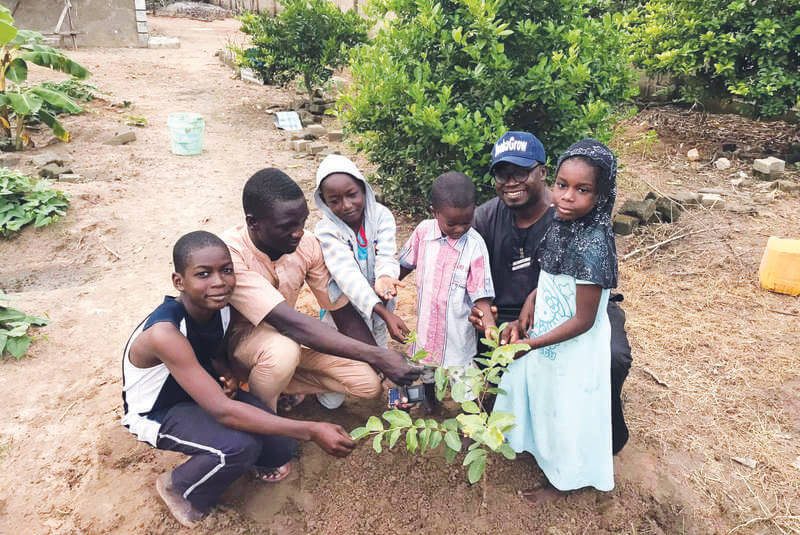
Eager to learn … Growing plants teaches us to be more patient, respectful and responsible.
Affectionately dubbed “Prof Brainy” by an admiring local media, Dr Dooba is a tireless advocate of community empowerment through increased awareness, skill training and start-up support for small scale gardening projects. His Dooba Foundation goes to schools throughout Central Nigeria to teach children how to plant fruit trees at home and in school gardens. They donate seedlings and show teachers how to integrate tree planting into the entrepreneurship curriculum.
“We also donate trees to any parent who is interested to help a child plant at their birthdays, so that the child can grow up together with the tree. We want to inculcate “birthday planting” by children so that they plant in sacks on the balcony or in the backyard.”
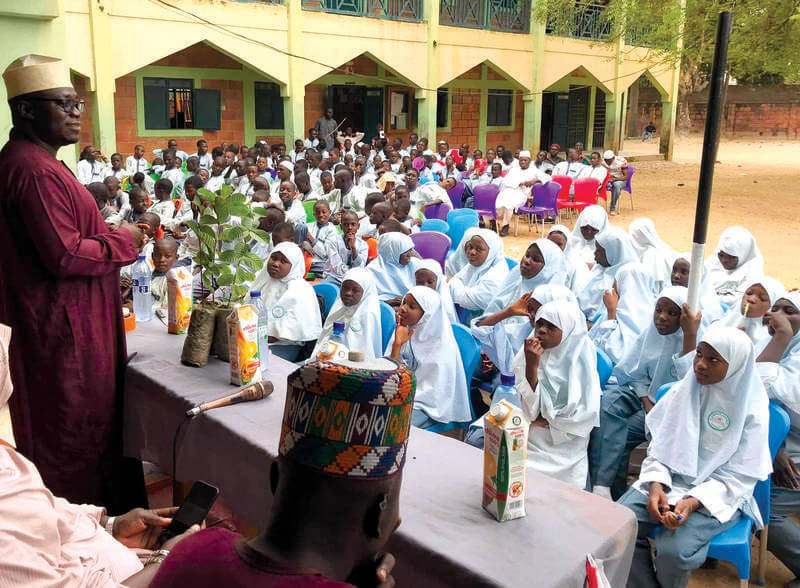
DoobaGrow assembly on tree planting with students and teachers at Fomwan Secondary School in Minna, Nigeria
“It goes beyond goals of economic opportunity, food security and traditional medicine,” Dr Dooba said. “Planting is one of those things that connect deeply with our psyche and improves wellbeing. There is ample scientific evidence of that. Above all, people here, especially Muslims, want to plant trees so that they earn a reward even after death because both humans and animals will benefit from them as shelter, food and medicine.”
“With DoobaGrow, we are trying to consolidate what we have, in time for the Fourth Industrial Revolution. Africa has 600 million hectares of farmable land. That’s more than what’s available in all the other continents combined. In my own Niger State alone, we have 76,000 square kilometres and 80% of that is arable. With the right balance of passion, knowledge and technology, Africa can feed the world!”
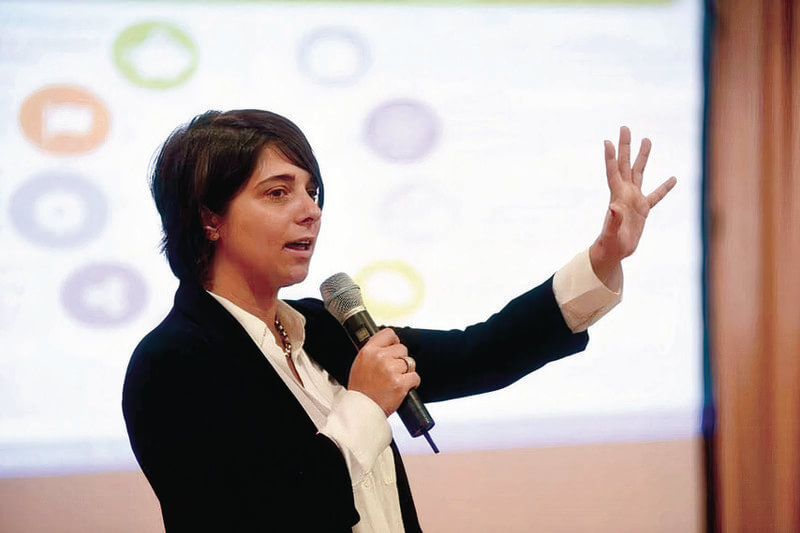
María Agustina Macías: “Technology empowers us to do more human things”
Technology as Empowerment in IR4.0
Technology development to assist the new cohort of balcony farmers is on the fast track. There are apps available in the Play Store that recognise plant species from uploaded photos, and provide all the details you would ever want to know. There’s a company – Babylon Vertical Farms in Selangor Malaysia – that designs and rents shelving for indoor urban vertical farming, capable of rendering 15 sq ft of balcony space equivalent to 2,000 sq ft of farmland, replete with sensors for IoT monitoring of growing conditions and harvest times. Many of the pre- and pro-biotic plant stimulant products used by home growers to treat flowerpot soil are made using nanotechnology.
“Sure, the agro-tech that’s hitting marketplaces now is very, very cool,” said Agustina Macías. “And so is the way it has been made scalable for household or urban use. But for me, that’s not what’s driving this new trend.”
“Instead, it’s the time-saving digital age innovations that make life easier. Those are the ones propelling our home-farming success. It’s improved ICT and better connectivity, new applications for remote shopping, IoT-enabled home appliances, and fintech solutions like the ones we are working hard to perfect in Argentina.”
“In a way, it feels like non-human gadgets and networks are empowering us with the time and the knowledge we need to do things that really make us more human – things like falling in love with the idea of growing our own food. I think that’s kind of beautiful, don’t you?”

Dr Alan Downe is a research fellow with the Digital Cities Research Institute at Malaysia’s Multimedia University (MMU) in Cyberjaya and a 4th Leap senior contributor. He specialises in strategy and operations in service industry firms, with deep knowledge in talent management, outsourcing, technology adoption and more.






